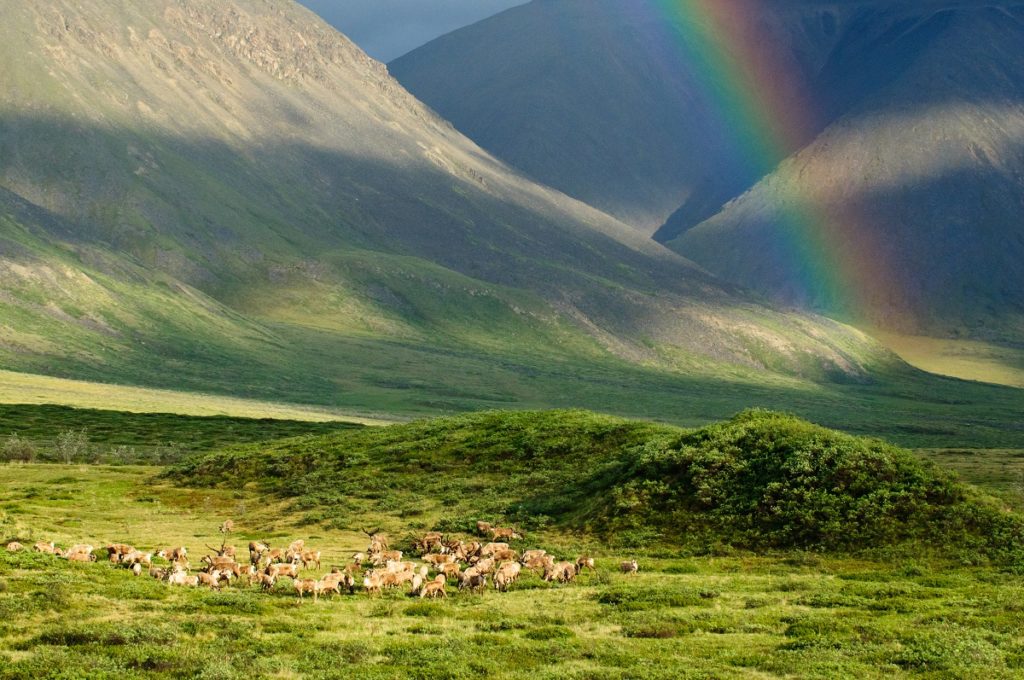An Arctic Refuge lease sale happened — so what now?

On January 6, as protests in Washington, D.C., morphed into an assault on the U.S. Capitol Building and democracy itself, thousands of miles away officials from the U.S. Bureau of Land Management were opening oil lease bids submitted for the Arctic National Wildlife Refuge coastal plain.
Despite $1.8 billion in revenue promised by drilling advocates in the lead up to the 2017 Tax Act, the lease sale yielded little more than $14 million, less than 1% of that amount.
In fact, the largest bidder wasn’t even an oil company, but a semi-public independent corporation owned by the state of Alaska. Fearing lackluster industry interest, the Alaska Industrial Development and Export Authority (AIDEA) rushed to hold a board meeting before the New Year to authorize its ability to bid. Read what our state director, Andy Moderow, had to say about that in his Anchorage Daily News op-ed.
In total, 529,356 acres out of the 1 million being auctioned were bid on today, including some of the most important areas for caribou calving, polar bear denning and bird nesting — areas of a priceless national treasure that were auctioned off for pennies on the dollar.



It’s of course an outrage that the administration — in its final days in office — went ahead with this lease sale. Together with you and so many others who care about wild places, Indigenous rights and our climate future, we have been fighting to protect this iconic landscape for more than half a century. In fact, here’s what Susan Eisenhower said in The New York Times about how her grandfather, President Dwight Eisenhower, who originally set aside the refuge in 1960, would be steadfastly opposed to today’s shortsighted action.
As I have shared with you before, we do not believe this lease sale will stand, and we feel confident that with the continued, steadfast activism, unwavering support and engagement of our members we will be able to block development and restore protections for the Arctic National Wildlife Refuge coastal plain.
President-elect Biden ran on a clear promise to protect the Arctic Refuge on day one, making it part of his climate plan, his agenda for Indigenous nations, and the Democratic National Committee platform. And with Democrats now on track to take control of the U.S. Senate following victories in both Georgia special elections, we will also soon have opportunities for corrective legislative action as well.
We are also in court, together with our Gwich’in and conservation allies and 15 states’ Attorneys General, challenging the legality of the environmental reviews that were the basis for this lease sale. We learned the night before the lease sale that we were unsuccessful in convincing the Alaska District Court to block the possible transfer of leases, largely because we could not overcome the high legal bar of proving the sale itself would cause irreparable harm. However, Judge Sharon Gleason did leave the door open to considering our case on the merits, and indeed, we could still get an ultimate decision from Judge Gleason that effectively overturns the sale.
Over the past year, a number of court decisions on similar oil and gas lease sale processes have voided or vacated leases due to the Trump administration’s failure to adequately take into account the environmental impacts of drilling or to allow for adequate public participation. For example, in May 2020 a federal court vacated 287 oil and gas leases issued by BLM that covered 145,063 acres of land in Montana, deciding that the Trump administration did not adequately consider risks to the environment and water supply. Other oil and gas leases have been overturned for lack of consideration of the cumulative climate impact from development.
Finally, we will be continuing our efforts to put direct pressure on those entities that did bid, seeking to deny them financing and insurance, and bringing direct public pressure in strategic ways. We’ll be looking closely at the bids from AIDEA, Regenerate Alaska, Inc., (connected to 88 Energy from Australia) and Knik Arm Services LLC as we explore these areas of leverage. Our collective efforts have already led to 30 U.S. and international banks and several insurance companies signaling an unwillingness to finance or underwrite Arctic drilling.
Thank you for being part of the Alaska Wilderness League and this fight, for standing with the Gwich’in, and for joining us in the next phase of this campaign.
Onward,
Adam

